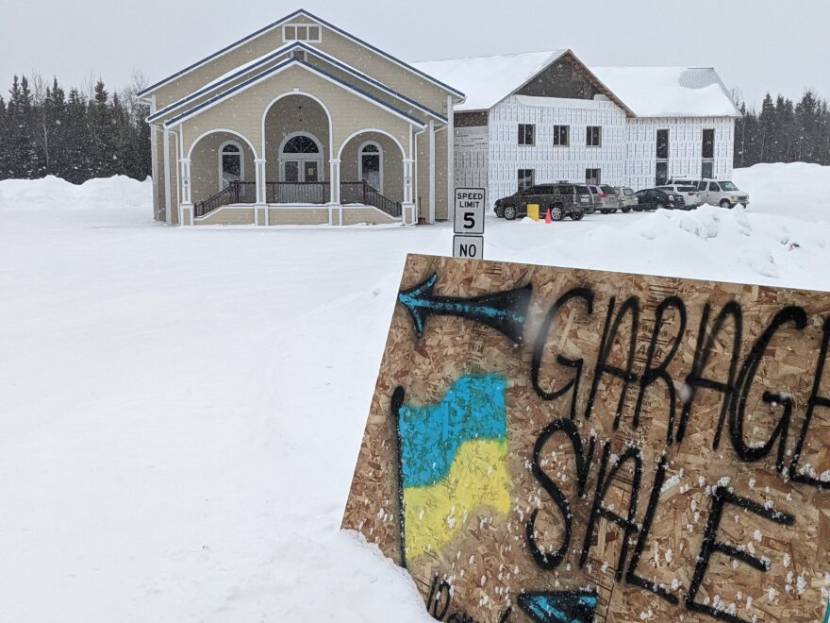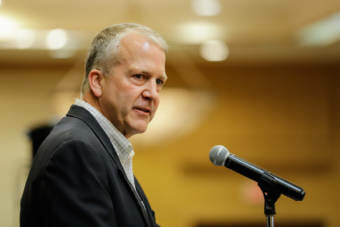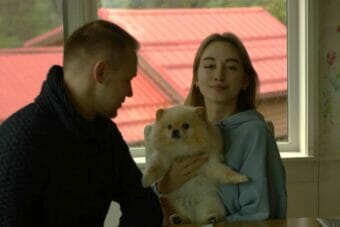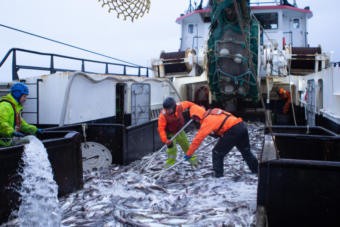
The state’s refugee coordinator has told local officials that refugees fleeing the war in Ukraine will begin arriving in Alaska over the next year or two, and some will be placed in communities where they have family ties.
Meanwhile, members of the Slavic community in Delta Junction say that a few have already arrived.
President Biden declared two weeks ago that the United States and its European allies will soon begin helping Ukrainian refugees find homes.
“Many Ukrainian refugees will wish to stay in Europe, closer to their home,” he said in a March 24 speech to NATO officials meeting in Brussels. “But we also will welcome 100,000 Ukrainians to the United States, with a focus on reuniting families.”
Last week, State Refugee Coordinator Issa Spatrisano began informing municipal officials that Alaska’s share of those refugees will be placed in some communities beginning next year.
Delta Junction was among the first places she contacted.
“We’re aware that in our state, there are a number of Ukrainians that live in the Delta area,” she said, “and they may have family members that will come join them.”
Refugees and immigrants from Ukraine and other Slavic-speaking nations in the former Soviet Union began to settle in the Delta area in the mid-1990s, after the USSR collapsed. They now make up an estimated 15% of the area’s population.
Some of those residents are already preparing to help their Ukrainian family members get settled in.
“If we do get refugees and we find accommodations for them, like housing and everything, I’m sure we’ll be able to help them with jobs,” said Igor Zaremba, a Delta Junction resident and member of the Word of Life church. “I mean, the construction season is just picking up.”
Zaremba sat in on Tuesday’s Delta City Council meeting. After the council reviewed the letter from Spatrisano, Zaremba told them about his church’s refugee assistance plans and asked if the city can help out “… to cover the bills, to cover food expenses and all that stuff until these refugees get on their feet and get a little more self-reliant.”
Mayor J.W. Musgrove said the city can’t offer any direct assistance but can help refer them to agencies that do.
Spatrisano says she’ll also inform Anchorage and Mat-Su officials about the refugees. Both municipalities also have sizable Ukrainian populations.
“If we’re aware of something that’s going to affect your local community through the U.S. Refugee Admissions Program, our goal is never to surprise people,” she said in an interview Tuesday.
Spatrisano works for Catholic Social Services, which oversees the U.S. State Department’s Refugee Resettlement Program in Alaska. She says the agency hasn’t yet advised her office on how many Ukrainian refugees Alaska might get through the program, or when they’ll begin arriving. But she says it’s likely take a while.
“This is not going to happen overnight,” she said. “The screening processes that are required for refugees take 18 to 24 months.”
Spatrisano says her program only handles Ukrainians who will come to Alaska through the refugee resettlement program. She says others who aren’t with that program may also come to Alaska.
Delta resident Vicky Shestopalov says that some are already here.
“We actually have a refugee family right now who is visiting us,” she said.
Shestopalov says they’re only temporarily staying with her parents, who are expecting another refugee family in the next couple of weeks.
“We do have a lot of Ukrainians here, with ties directly still in Ukraine, trying to move their families out,” she said in an interview Wednesday.
Shestopalov says local Ukrainian-Americans are organizing their own refugee assistance efforts because they’re increasingly alarmed at what they’re hearing from family and friends who are still in the war zone.
“When you talk with your friend first-hand, it’s shocking,” she said. “It’s devastating, you know, and it’s just scary what’s happening there right now.”
Shestopalov says she’s glad the federal government is offering refugee status to Ukrainians. But she and other members of the local Slavic community also hope the federal government will help other victims — including Russians
She says many Russians oppose the war, and many others don’t know much about it.
“I have friends here and all over the U.S. who’ve been trying to get their Russian family members out of Russia,” she said. “They’re telling them, ‘Hey! There’s this war in Ukraine that’s happening! Get out of there before you get recruited or whatever!”


